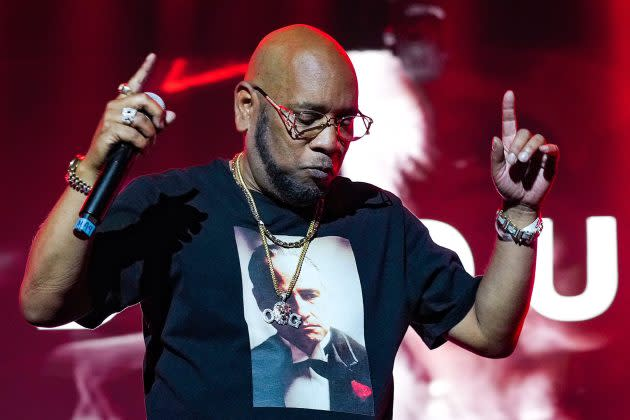In what’s shaping up to be a major legal drama in the music industry, Rodney O, the legendary rapper behind the classic track “Everlasting Bass,” has filed a lawsuit over unpaid royalties stemming from his sample used in the popular diss track “Like That” by Future and Metro Boomin. This track, which features a fiery verse from Kendrick Lamar, went viral in 2025 as it took shots at rap titans Drake and J. Cole, but for Rodney, the success of the song has come with a bitter aftertaste—he claims he hasn’t received a dime for his contribution.
Rodney O isn’t throwing shade at Kendrick Lamar, Future, or Metro Boomin; instead, he’s pointing the finger at Epic Records and the Barry White Estate. According to his lawsuit, the proper clearances and royalties were never negotiated or paid out for his sample, despite Metro Boomin‘s team allegedly paying $50,000 to secure the sample’s use.
The Legal Battle: Rodney O’s Claims Against Epic Records and Barry White Estate
Rodney O, whose 1990 hit “Everlasting Bass” was sampled in the track, is now suing for unpaid royalties. In the legal documents obtained by TMZ, Rodney explains that although he was contacted by Epic Records about negotiating a deal, the final version of “Like That,” featuring Kendrick Lamar’s verse, was released without his full approval. Rodney asserts that neither he nor his team were properly consulted before the track blew up worldwide.
“I didn’t even get a chance to see if I had any kind of relationship with Drake before they released that version,” Rodney O said in a recent interview with TMZ. The situation gets more frustrating for the rapper, as Epic Records allegedly neglected to involve him in the decision-making process, which ultimately led to his lack of compensation.
Rodney’s grievances don’t stop there. Not only was he not compensated, but he also claims that Epic Records and the Barry White Estate excluded him from songwriting credits when the track was nominated for a Grammy in 2025. He feels snubbed, especially given the widespread success of the song, which became one of the most talked-about tracks in recent hip-hop history.
Metro Boomin’s Response: ‘All Clearances Were Secured’
In a statement to TMZ, a representative for Metro Boomin defended the producer, stating that he had indeed secured all the necessary clearances for the “Everlasting Bass” sample and paid $50,000 to Rodney O for the use of his work. Metro’s camp emphasized that the issue of unpaid royalties likely lies with the Barry White Estate, not them or Future.
The rep added, “This is not the first time Metro has handled such matters. He has a long track record of ensuring all sample clearances are handled properly and paid for.” This leaves the question of whether Barry White’s estate is holding up the payments.
Rodney O, however, maintains that his issue is not with Metro Boomin, Future, or Kendrick Lamar but rather with the parties involved in the sample clearance and payment process—namely, the Barry White Estate and Epic Records.
The Barry White Estate’s Role in the Dispute
The Barry White Estate is at the center of this ongoing legal battle. Rodney O claims that the estate has been holding up the royalties and preventing him from receiving his due compensation. According to his lawsuit, Kanye West’s remix of “Like That,” which also uses a Barry White sample, is the only place where this issue has arisen, as the Barry White Estate did not approve the use of the sample in the way it was ultimately utilized.
Despite attempts to reach the Barry White Estate for comment, there has been no response as of yet. Rodney O is adamant that the estate is the primary party responsible for the royalties not being paid out to him.
Kendrick Lamar’s Verse on ‘Like That’: A Diss Track That Shook Hip-Hop
The “Like That” track became a cultural phenomenon thanks to Kendrick Lamar’s scathing verse aimed at Drake and J. Cole. The diss track quickly went viral, sparking debates and conversations about the ongoing tensions between these rap icons. However, while the track’s success was undeniable, the controversy surrounding the sample clearance has overshadowed the music for Rodney O.
Rodney, reflecting on the situation, stated, “I don’t really have beef with Kendrick or Metro, but the way Epic handled this situation left me out in the cold. I should have been properly credited, and I should have been paid for my work.”
What’s Next for Rodney O and the Legal Battle?
As the lawsuit moves forward, Rodney O continues to demand justice for his contribution to the song. His fight against Epic Records, Metro Boomin, and the Barry White Estate is not just about money—it’s about ensuring that artists are fairly compensated for their work, especially when their contributions are used in chart-topping, Grammy-nominated tracks.
Rodney’s case has brought to light the sometimes murky world of sample clearances and royalties in the music industry, sparking a broader conversation about how hip-hop’s sample-heavy culture is managed and how artists can better protect their intellectual property.
Conclusion: A Deeper Look at Hip-Hop’s Legal Landscape
The legal drama surrounding Rodney O and his sample from “Everlasting Bass” sheds light on the complexities of sample clearance in the music industry. While Metro Boomin and Kendrick Lamar may not be the main culprits in this case, their involvement in a track that has become a defining moment in the ongoing Drake vs. Kendrick Lamar saga adds another layer of intrigue.
As fans eagerly await developments in the lawsuit, the dispute between Rodney O and the Barry White Estate serves as a reminder of the challenges artists face when it comes to receiving proper recognition and compensation for their work.








